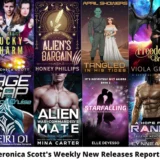The first time I stumbled across Juliet Marillier’s books was years ago when I came across a beat-up copy of Wildwood Dancing in an op shop. I picked it up primarily for the gorgeous cover, and immediately fell in love with the beautiful writing, and the mystery of the Otherworld. Since then, I’ve read most of her books, and I’m never not surprised by how amazing they all are.
Recently I was given the pleasure of reading The Harp of Kings (her newest release) and interviewing Juliet herself. Do yourself a favour and take a peek inside the brains of one of the most amazing authors in the Southern Hemisphere!
Hi Juliet! Can you tell us a little about yourself?
Hi Peta! I’m a full time author of historical fantasy, born and raised in New Zealand but now a long-term resident of Western Australia. I’d describe myself as part writer, part musician and part crazy dog lady. I’m also a mother of four and a grandmother of eight. I belong to a druid order, OBOD (the Order of Bards, Ovates and Druids.) I love fairy tales, folklore and mythology, all of which have a major influence on my writing. I’ve now written twenty-two novels and a number of short stories.
What can readers expect in The Harp of Kings?
The story is set in the same world as my Sevenwaters and Blackthorn & Grim series, an imagined version of early medieval Ireland. Readers will meet three characters who are competing for places in an elite and secretive warrior band which has its headquarters on Swan Island. The Swan Island team can be hired by kings and chieftains to perform covert missions including spying. Liobhan, as the only woman among the twenty trainees, is strong, determined, and at times rather blunt. Her brother Brocc is a more sensitive and reserved person. These two are talented musicians; before arriving on the island they often performed in a band. Then there’s Dau, a brilliant but not very likeable trainee, Liobhan’s arch rival. As the story unfolds, the reader gains insights into what shaped him. These three are sent out on a mission while still in training, the talents of Liobhan and Brocc being ideal for a job requiring spies under cover as musicians. Our characters are drawn into a complex mystery involving druids, kings, a royal family in crisis, and the involvement of forces beyond the human world. There’s plenty of action, intrigue, folkloric magic and a hint of romance.
Where did you draw your inspiration for the Otherworld?
From a lifelong love of fairy tales, folklore and mythology, especially that of the Celtic countries of my ancestry. I still read traditional stories as well as scholarly works about them, and as a druid I give a lot of thought to what they mean and what they can teach us. There are some concepts and story elements in The Harp of Kings that draw from Irish mythology. In any story I try to incorporate what my (human) characters might have believed in at the time, though in this period Christianity was spreading quickly across a country where people previously followed earth-based faiths, Druidry being one of those. The Otherworld characters play a bigger part in this series than they do in most of my earlier novels, and I try to show how different their thinking and their values are from those of the human characters – when the two races find themselves at close quarters and needing to cooperate, there are all sorts of difficulties. As well as recognising the traditions, I did create quite a few of the fey characters entirely from my own imagination, the smaller ones especially! The physical settings for the Otherworld scenes are based on a very beautiful part of Ireland, near Lough Erne. I’ve stayed there before and will be doing so again soon. If I don’t come back, you’ll know I strayed into the Otherworld.
I’ve noticed that music features prominently in this book. Can you tell us some of your favourite songs or artists?
Big question! I’ll certainly show my age here, but never mind that. I am a classical musician by training but I love folk music too. Favourite band, the Scottish Celtic rock band Runrig, sadly no longer doing gigs. I also love the American Celtic band, Cherish the Ladies, which features the wonderful Joanie Madden on the whistle – in The Harp of Kings, Liobhan is a brilliant whistle player and I imagined her playing like Joanie, with both heart and virtuosity. Closer to home, I very much admire Lior, such a versatile musician. When I wrote the character Brocc, I was thinking of a singing voice that makes people go quiet, brings tears to the eyes, and conveys a message far beyond the music itself. Lior’s voice is like that.
Who was your favourite character to write?
Initially it was Liobhan. With her courage and physical presence, she’s the woman I wish I had been at eighteen! But I enjoyed creating a voice for each of the three protagonists. I ended up with a new favourite. Often the most troublesome characters are the most interesting to write.
I love how the rules for the Fae seem to draw on classic mythology. How much research did you do for that?
My Otherworld folk owe something to Irish mythology, though in this book they have dwindled in power and status as humankind gradually loses belief in the old tales. The clan we meet is a motley crew of beings. They are all individuals. I based them partly on ideas from folklore, partly on the sort of uncanny folk I’d featured in my earlier Irish books, and partly from my own imagination. While the tale of the Harp of Kings is not a traditional story, it has elements of Irish mythology in it, dating back to the time when the first human tribe, the Milesians, set foot on the shore of Ireland and disturbed the peace of the uncanny races who lived there. That was my main area of research for this particular book.
Can you give us any hints about where this series is headed?
Book 2, provisionally titled A Dance with Fate, takes our protagonists on a different journey, sparked off by a dramatic event that turns their lives upside down. There will be more Otherworld action, a mystery to solve, poison, monks, a large payment in silver, and developments concerning the menacing and enigmatic Crow Folk. Our central characters are physically and emotionally tested to breaking point.
You have quite a few books out now. Do you have any advice for aspiring authors?
Three pieces of advice:
1. READ as widely as you can, across many genres, not only the one you want to write in. That includes fiction in many genres, non-fiction, poetry, journalism. It’s a great way to learn about style and structure and how to tell a story effectively. You will never become a good writer if you are not also a reader.
2. WORK HARD on your craft. Make time for writing, ideally doing some every day, whether it’s a gradually developing story, a personal journal, a poem. Join a writers’ group and learn how to give and receive critique. Read great books on the craft. I recommend the blog Writer Unboxed, which is all about the craft and business of writing and has many excellent contributors.
3. Think about WHY you want to be an author. Is it so you can be rich and famous and have zillions of followers on social media? Or is it because you love writing and you have a story that is desperate to be told? You know which is the right answer. Don’t write to please the market; write the story you feel passionate about.
Was being a writer a childhood dream or did it come along later?
It must have been a childhood dream because I started writing stories pretty much as soon as I could put pencil to paper. I also drew some pretty wacky pictures as a child, the sort of thing that was a fantasy story in itself. My early stories included one about dinosaurs being found still living in Fiordland, New Zealand, and one about rampaging killer robots. However, I ended up pursuing another passion, music, and it was only after a career as a singer and music teacher, plus a stint in the public service, that I started writing fiction again much later. I was writing more for therapy than anything – I’d been through a tough patch in my personal life – but that manuscript ended up getting me my first book contract.
Do you have any book recommendations for us?
Where do I start? One of my favourite recent reads was The Mere Wife by Maria Dahvana Headley, a mind-bending literary fantasy based on Beowulf, with the story driven by the women characters. This would be an ideal book club choice, as it engages both the heart and the intellect and is highly original. The Binding by Bridget Collins was also brilliant. It’s based on the concept that a person’s painful memories can be written down and bound into a book, and thereby erased from that person’s mind. We follow a young man who is apprenticed to a binder, and gradually realise that this craft can also be used to sinister purpose. There’s a wonderful love story in this novel, incredibly clever storytelling and unforgettable characters. My third choice would be Circe by Madeline Miller. This author’s ability to tell a story with such emotional intensity and such immediacy, despite the time frame being very long (the protagonist is the daughter of a god) is impressive. This book is a feast for the senses, full of the sounds and tastes and textures of its Mediterranean settings.









